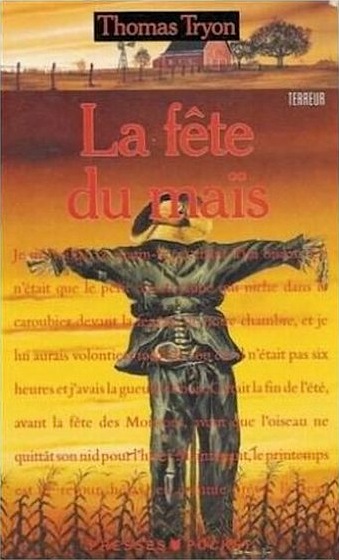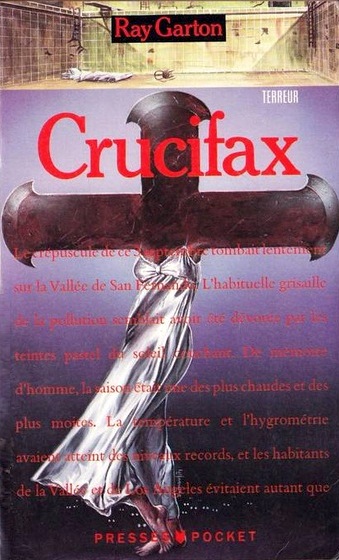All I recall about my reading of this paperback of the bestselling
Harvest Home (Fawcett Crest/June 1974) in the late 1980s is that there was one scene that left me breathless with horror, but I have never been able to remember specifically
what happened in that scene. Rereading it recently proved no help, as there were
several scenes that now left me breathless with horror. Well, maybe not breathless exactly, but in a state of extreme suspense. Actor-turned-author
Thomas Tryon (1926-1991) continued his success after 1971's
The Other, another tale of quiet down-home horror.
Long a well-known pre-
Stephen King bestselling horror novel, I
assume many readers of TMHF will be familiar with
Harvest Home's set-up: New York
ad-exec Ned Constantine wants to paint full-time, so he and his family
(wife Beth and sulky asthmatic teen daughter Kate) buy, through some
coincidental luck, an 18th century home in New England's Cornwall
Coombe. This pocket of "heart's desire" is of course as picturesque a
country town as one could imagine, a veritable rural Shangri-La of
endless cornfields and dark woods.
The Constantines settle in, welcomed
by some, looked at askance by others, but generally find things
satisfying. Life revolves around corn here, everything is tied to its cycles ("the
eternal return"); these people are an ancient agrarian culture living in
the 20th century. Most welcoming to them is aged matriarch Widow Fortune, a bespectacled
black-skirted dowager who dispenses down-home wisdom and tends her farm
with the energy of someone half her age. She speaks in that
maddening country way in which answers only raise more questions.
"Just what is Harvest Home?" I asked.
"Harvest Home?" [the Widow Fortune] peered at me through her spectacles. "Why, I don't think I ever heard a pusson ask that before. Everybody knows what Harvest Home is."
"I don't."
"That's what comes of bein' a newcomer. Harvest Home's when the last of the corn comes in, when the harvestin's done and folks can relax count their blessin's... It means success and thanks and all good things. And this year's the seventh year."
"The seventh year?"
"Ayuh. For six years there's just feastin' and carryin' on but the seventh's a special one. After the huskin' bee there's a play, and—well the seventh year's particular for us. Harvest Home goes back to the olden times."
"When does it come?" "She looked at me as if I were indeed a strange species. "Never heard a pusson ask that either. Harvest Home comes when it comes—all depends."

Ned and family learn all about this Harvest Home business as they meet the inhabitants of Cornwall Coombe. Tryon does an able job of introducing characters and keeping them distinct personalities. There is Justin Hooke, the Harvest Lord (a traditional role in the festival with many perks and only one downside); his wife Sophie, chosen to be the Corn Maiden; Tamar Penrose, seductive postmistress who spells trouble for Ned, mother of little Missy, creepy little Missy who makes creepy little pronouncements about the future; Jack Stump, local ragamuffin man with a big mouth; the Soakses family, dangerous hillbillies out in them thar woods; Robert Dodd, a blind, retired college professor; and Worthy Pettinger, a rebellious, reluctant teen who has been chosen (by Missy in a creepy little scene) to be the next Harvest Lord.
You'll spend a lot of time with these folks, and more. Bit by tiny bit Tryon ratchets up mystery and foreboding, and the downhill swing begins when poor Jack Stump gets his... well, I won't spoil it.
Ned becomes close with young Worthy, who may have innocent designs on Kate, and finds that Worthy is none too happy about being the next Harvest Lord. It's more than just teenage surliness; Worthy seems almost panicked and eventually leaves town, trusting only Ned. This is a huge disgrace to the Pettinger family. And the more Ned tries to learn about Cornwall Coombe, the more mystified he is, especially after he notices the gravestone of one Gracie Everdeen, outside the cemetery proper. What happened to her? How did she disrupt Harvest Home years earlier? Did she really kill herself? This unsettling tale swirls beneath everything that happens, a dark secret Ned pieces together himself.
The hinge of
Harvest Home
is that readers must be in as much perplexity as Ned himself; I'm not
sure they are, at least today. Those worldly smarts of a city slicker,
his arrogance and condescension, mis-serve him in the environs of
Cornwall Coombe and he misapprehends much, till it's too late. Of
course. It wouldn't be a horror novel if he figured out what
Harvest Home really was all about 20 pages in, would it?! The long climax I think works, secrets and horrors and suspicions piling up till a final reveal that satisfies, and must have even more shocking in the early '70s. Tryon writes a composed line of prose, thoughtful, literate, upper-class; this lends a gravitas to the proceedings which enhances the horrors.
Relying a little too easily on cultural stereotypes—the simple ways of countryfolk, their unthinking allegiance to tradition, their lusty women, their secrets and their distrust of outsiders as well as insiders who don't conform, the bloody rituals of paganism—
Harvest Home could seem dated to the modern general reader. Gender politics may grate: Beth and Kate are somewhat under-characterized, Tamar is an evil vamp, yet Widow Fortune emerges as one of the great characters of '70s horror fiction (no surprise she was portrayed by the venerable screen legend Bette Davis in the TV movie adaptation). While touted as a horror novel,
Harvest Home is not just that; the tactics of suspense loom larger than generic horror conventions. Some might not have patience for the hundreds of pages of country livin'.
Those looking for a roller coaster ride of shock and violence would well remember that this novel predates King and his progeny on the bestseller lists. Aside from a few moments here and there the tone is one of taste—at one point Ned goes to a doctor for fertility test and the exact mechanics of that go completely unmentioned! The lone violent, overheated sex scene, promised in early chapters and delivered near the last, was sure to please adventurous readers who wanted some well-written salaciousness between the hardcovers.

One bit of cleverness I noted on this reread: is the name "Constantine" a little in-joke for the history buff? Constantine the Great, the Roman Emperor who converted and stopped the persecution of Christians and heralded its spread over the Western World, hastening the end of pagan rites and worship as he and his heirs destroyed their holy sites. Ned is confounded by the villagers' atavistic beliefs and rather than overcoming them, he is overwhelmed, very nearly killed by the same kind of believers his namesake persecuted: a bit of literary comeuppance, perhaps? Perhaps.
As I said, Tryon takes his time setting up scares but boy does it pay off. This leisurely approach makes
Harvest Home that kind of read that's perfect for fall—for summer too if you need to take the heat off—providing hours of cozy chills as the season of the dead approaches, as it does every year, a
s it will continue, forever, the Eternal Return, for thus it was since the Olden Times.



























